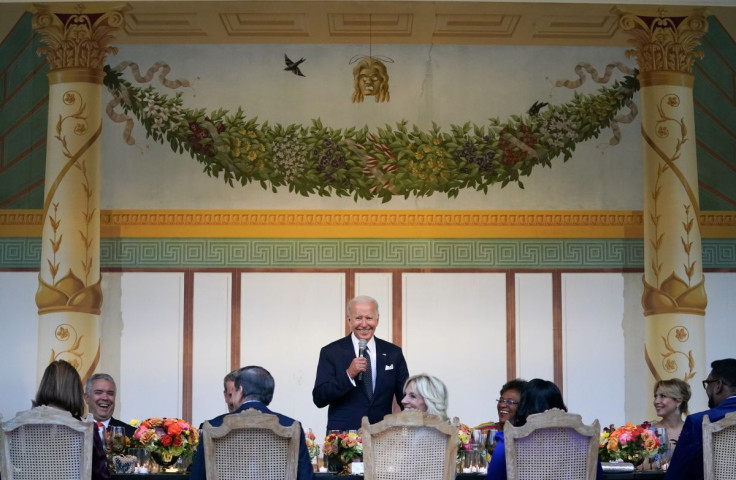U.S. Unveils Migration Plan At Americas Summit Roiled By Division

The United States on Friday unveiled a long list of measures to confront the migration crisis as President Joe Biden and fellow leaders prepared to issue a joint declaration thrashed out at a fractious Summit of the Americas.
The White House touted a series of programs agreed by countries across the hemisphere and Spain - attending as an observer - that include taking in more guest workers and to provide legal pathways for people from poorer countries to work in richer ones.
The Biden administration, facing a record flow of illegal migrants at its southern border, pledged hundreds of millions of dollars in aid for Venezuelan migrants across the region, renewed processing of family-based visas for Cubans and Haitians and eased the hiring of Central American workers.
The announcements on the final day of the Los Angeles summit are part of a U.S.-led pact dubbed the "Los Angeles Declaration" and aimed at creating incentives for countries taking in large numbers of migrants and spreading responsibility across the region. But some policy analysts are skeptical that the pledges, some of which appear mostly symbolic, are meaningful enough to make a significant difference.
The plan caps a summit hosted by Biden that was designed to reassert U.S. leadership and counter China's growing economic footprint in the region with a set of initiatives, including a new economic partnership that appears to be a work in progress.
However, that message was clouded by a partial boycott by leaders, including Mexico's president, to protest Washington's exclusion of leftist U.S. antagonists Cuba, Venezuela and Nicaragua. The summit's line-up was thinned down to 21.
At the summit's opening on Thursday, leaders from Argentina and tiny Belize rebuked Biden face-to-face over the guest list, underscoring the challenge the global superpower faces in restoring its influence among poorer neighbors.
On Friday, Chile, the Bahamas, Barbados and Antigua and Barbuda joined the criticism, though Biden was not present. "We can't have exclusions," said new Chilean leftist President Gabriel Boric. The summit's line-up was thinned down to 21.
The declaration, due to be presented by Biden and other leaders on Friday, "seeks to mobilize the entire region around bold actions that will transform our approach to managing migration in the Americas," the White House said.
Though Biden had previewed the migration plan as "ground-breaking," a person familiar with the matter said some countries are unlikely to endorse it. Some Caribbean states are expected to withhold their approval, an official said.
U.S. officials were working up until the last minute to persuade skeptical governments to accept, or at least not openly oppose, any of the provisions, another person familiar with the negotiations said.
U.S. officials believe the open backlash Biden faced in Thursday's session reinforced the determination of some leaders against caving in to American pressure over the declaration, the source familiar with the matter said.
Some initiatives listed by the White House had been previously announced.
The summit sessions regularly rang out to U.S. composer's John Philip Sousa's "The Liberty Bell" march, a tune popularized by the classic British comedy show "Monty Python's Flying Circus."
LIMITED EFFECTS
"Addressing the unprecedented migration crisis in the region requires us to rethink how we view multilateral development finance and how we manage the strains on our economies," the White House said.
Eric Olson, director of policy and strategic initiatives at the Seattle International Foundation, called the declaration a "useful framework for working on solutions" but said it would likely have limited near-term effects because it is non-binding.
Mexico, whose long border with the United States is the main point of irregular migration - will back the declaration, an official said, despite President Andres Manuel Lopez Obrador's no-show.
The absence from the summit of the leaders of Guatemala, Honduras and El Salvador - the Northern Triangle region from which many migrants come - has raised doubts how effective the pledges will be. U.S. officials have said the turnout would not prevent Washington from getting results.
The declaration encompasses commitments by an array of countries, including Mexico, Canada, Costa Rica, Belize and Ecuador. There was no mention, however, of any pledges by Brazil, Latin America's most populous nation.
The White House's announcement did not include any U.S. pledges for additional work visas for Mexicans. That would form part Lopez Obrador's visit with Biden next month, an official said.
Observer Spain pledged to "double the number of labor pathways" for Hondurans in its migration program, the White House said. Madrid's temporary work program enrolls 250 Hondurans, suggesting only a small increase is envisioned.
Curbing irregular migration is a top priority for Biden as the number of attempted illegal border crossings has risen to record highs.
Republicans, who hope to regain control of Congress in November elections, have pilloried the Democratic president for reversing the restrictive immigration policies of Republican predecessor Donald Trump.
But migration has had to compete with Biden's other challenges at home and abroad including high inflation, mass shootings and the war in Ukraine.
© Copyright Thomson Reuters 2024. All rights reserved.







